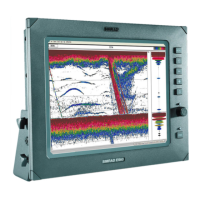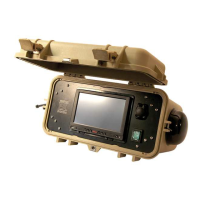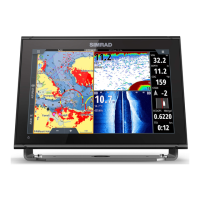Do you have a question about the Simrad AP80 and is the answer not in the manual?
Legal notice regarding product use, liability, and governing language.
Lists regulations the AP70/AP80 systems comply with, including Wheelmark and EMC directives.
Explains the Wheelmark directive and its implications for marine electronic navigation equipment.
Refers to the separate warranty card and website for queries.
Describes the manual's purpose, update policy, and how important text is emphasized.
Details the function of each key and control on the AP70/AP80 front panel.
Explains the different display panels and their information content.
Provides critical safety warnings and guidelines for using the autopilot.
Details the procedure for powering the autopilot unit on and off.
Explains how to navigate and use the system's menus via the rotary knob and keys.
Explains how to use dialog boxes for input, confirmation, and cancellation.
Details how to adjust display brightness and switch between day/night modes.
Explains how to take control from any unit and the active/passive unit status.
Describes how to switch between Standby, Auto, and Nav steering modes.
Details how to select from the available work profiles for different operational conditions.
Explains how thrusters are connected and used with the autopilot system.
Explains how SimNet group settings define station roles and command transfer principles.
Describes an open system where control is accessible from every unit.
Introduces the Master function for controlling command transfer in Wheelmarked systems.
Explains how to set up a master station and define a master unit.
Details how to unlock the master system for remote operation.
Explains how to request and accept command from a locked unit in a master system.
Lists and describes the autopilot's various steering modes and their required inputs.
Details Standby, NFU, and FU steering modes and their respective info panels.
Explains the AUTO compass mode and the NoDrift mode.
Explains the NoDrift mode for steering along a fictive track line.
Introduces a feature for setting turn parameters before a turn starts.
Explains navigational steering using external navigator data for waypoints or routes.
Explains the AP80's track steering feature with ECDIS integration.
Details the process of obtaining and entering an unlock key for track steering.
Guides on setting up and starting track steering with ECDIS.
Discusses adjusting parameters like Track response, Rudder, and Counter rudder.
Describes the default profile, its initial assignment, and recommended use during commissioning.
Explains how to define new profiles for different operational modes or crew preferences.
Outlines the various settings available within a work profile.
Describes how to export and import work profiles to/from a USB stick.
Differentiates between alarms and warnings and their implications.
Explains how alarms are indicated on the display, including alarm icon and dialog.
Describes how alarm dialogs appear for single or multiple messages.
Explains options for acknowledging messages: ACK and Mute.
Details how to adjust limits for compass, course, and sharp turn alarms.
Describes alarms related to missing sensors or components during automatic steering.
Provides a comprehensive list of alarms, their causes, and recommended actions.
Details procedures for cleaning the display and checking connectors.
Describes the process of resetting the system to factory default settings.
Guides on where to find and how to install the latest software.
Recommends copying user settings files as part of a backup routine.
Explains how to use the file management system to copy settings to a USB stick.
Explains the mode-dependent Quick menus and their access to settings.
Explains how system configuration settings are grouped and accessed.
Covers user settings that do not affect autopilot performance.
Explains creating and managing vessel's work profiles.
Details alarm listings and settings.
Describes devices connected to the CAN bus network and their configuration.
Covers dockside and seatrial calibrations.
Guides through the initial setup process after first startup or factory reset.
Details setup and selection of data sources from the Network menu.
Explains how to view device information, configure, and access settings.
Introduces the Master function for controlling command transfer in Wheelmarked systems.
Covers dockside and seatrial configuration of drives and compass calibration.
Guides on calibrating magnetic compasses for autopilot seatrial.
Provides guidance on manual and automatic tuning for optimal steering.
Explains the autopilot's learning process by observing boat behavior in AUTO mode.
Details the process of automatic tuning using S-turns to set parameters.
Explains how to manually adjust Rudder and Counter rudder parameters.
Provides a list of abbreviations used in the autopilot display.
| Brand | Simrad |
|---|---|
| Model | AP80 |
| Category | Marine Equipment |
| Language | English |











